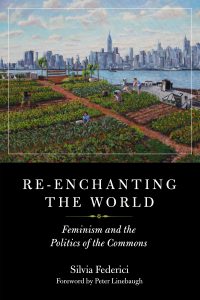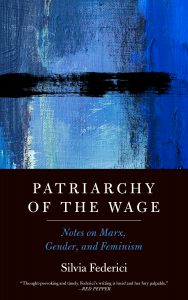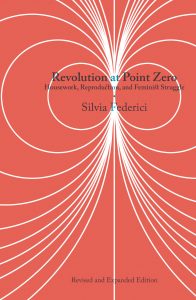Silvia Federici has been warning of what happens when we undervalue domestic labor for decades.
Prospect Park in May is a commotion of beauty: meadows and dense rambles, hills and hollows, everything covered in chokeberries, spicebush, violets, flowering hawthorns, magnolias and lindens. In this splendor the birds are boisterous, as are the people. But last May, the park was quieter than usual, and the people moving through it had a subdued, worried energy. Many wore masks; many did not. Occasionally someone shouted at someone else for coming too close. There was both fear of breathing common air and a desperate craving for it. Through this scene proceeded, at an energetic pace, Silvia Federici, the 78-year-old scholar and theorist of domestic labor, one of the most influential socialist feminist thinkers of the last century.
Federici had a black scarf tied over her nose and mouth, and she was wearing a delicate blue sweater her mother made long ago. Federici walks all the way around Prospect Park at least once every day, even in the winter, with her partner of 47 years, the philosopher George Caffentzis. (Caffentzis learned he had Parkinson’s disease a few years ago, she explained, and the walking helps him stay well.) But for several days in May, she agreed to do a second daily walk with me.
I had asked to meet because the pandemic and its cascade of economic, social and political breakdowns had led to a profusion of Federician thinking in places I had never encountered it before. Suddenly notions and phrases from her work were all over my social media feeds, op-ed pages and exchanges with friends, as people confronted what kinds of labor are considered essential and why. Federici is a longtime advocate of the idea that domestic work is unwaged labor and was a founder of the Wages for Housework movement in the early 1970s. It is a form of gendered economic oppression, she argues, and an exploitation upon which all of capitalism rests.
As a scholar and activist, Federici is one of a cohort of thinkers who have, for decades, critiqued the way capitalist societies fail to acknowledge or support what she calls “reproductive labor.” She uses this term not simply to refer to having children and raising them; it indicates all the work we do that is sustaining — keeping ourselves and others around us well, fed, safe, clean, cared for, thriving. It’s weeding your garden or making breakfast or helping your elderly grandmother bathe — work that you have to do over and over again, work that seems to erase itself. It is essential work that our economy tends not to acknowledge or compensate. This disregard for reproductive labor, Federici writes, is unjust and unsustainable.
These ideas weren’t exactly obscure before the pandemic. But mainstream feminism — not to mention mainstream economics or politics — has mostly ignored domestic labor. Instead, it has measured women’s empowerment by their presence and influence in the workplace, which is attained by outsourcing housework and child care to less economically advantaged women for a low wage. Even so, women remain mired in housework. It’s common now to hear the term “the second shift” (coined in 1989 by the sociologist Arlie Hochschild), which describes how the work of maintaining a home and caring for children still falls disproportionately to women, even if they have full-time jobs and pay for help. What’s more, people who are paid to do domestic labor or care work (like elder care or house cleaning) are, as a group, badly compensated and denied workplace protections or benefits. These jobs are held mostly by women of color and immigrants. The arrangement is hardly a success for women at large.
Public-policy experts and economists have pointed out in the last several years, the folly of excluding domestic work from economic measures like G.D.P., given the data showing that unpaid women’s work constitutes a huge slice of economic activity in every country. A year ago, Oxfam circulated research indicating that if American women made minimum wage for the work they did around the house and caring for relatives, they’d have earned $1.5 trillion in 2019. Globally, the value of that unpaid labor would have been almost $11 trillion. In a 2019 speech, Marilyn Waring, a public-policy scholar and longtime advocate of revising economic measures of “productivity,” noted the absurdity of defining activities like caring for elderly relatives or newborns, shopping and cooking, as having no value, or as leisure. “You cannot make good policy if the single largest sector of your nation’s economy is not visible,” she said. “You can’t presume to know where the needs are.”
This isn’t the only part of the present economic system that seems awry. The wealth gap is as wide as it has been in hundred years, with more workers than ever in unstable or low-wage employment, or subject to the whims of the “gig economy.” As the exhaustion and insecurity caused by these economic conditions have deepened, more and more people are coming around to the idea that the morass of America’s social ills might be traceable to an incorrect relationship to work and the question of whose work is valuable.
‘You cannot make good policy if the single largest sector of your nation’s economy is not visible.’











